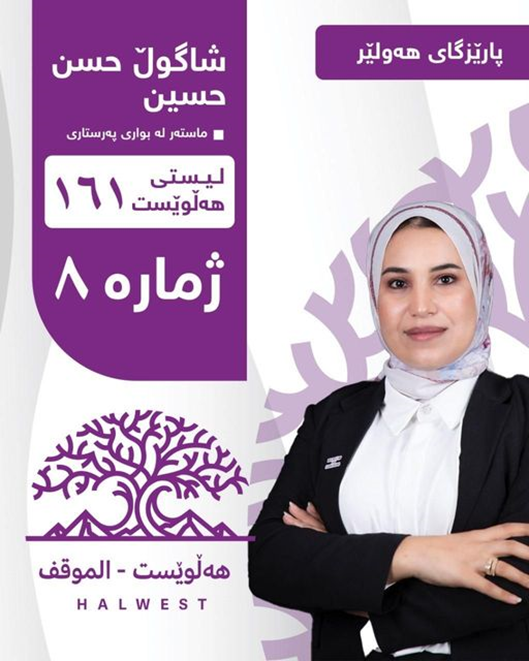Among the candidates are several doctors and healthcare professionals. We have gathered opinions from some of them regarding their electoral programs, which they plan to bring to the parliament if they win these seats. We will later monitor their work in the parliament to compare their promises with actual achievements.
Dr. Omed Ali
A physician at Shar Hospital, known for good work, humility, and service, nominated by the Patriotic Union of Kurdistan
Issuing laws and regulations related to the health system in Kurdistan, defining the roles, duties, and rights of both the public and private sectors.
Issuing specific laws and regulations for health insurance, which was previously in place in Iraq. This system should now be implemented in a modern way to provide the best health services to citizens, especially in primary healthcare, free of charge.
Localizing medications and medical supplies, ensuring both the safety of medicines and devices in collaboration with global companies, and achieving significant economic savings that would otherwise go to commercial companies.
Organizing and linking health institutions electronically to bypass bureaucracy and expedite work processes.
Committing to and working on implementing the plan and work program of the political entity in parliament.
 Dr. Mohammed Abdul Wahab
Dr. Mohammed Abdul Wahab
Works at Hiwa Hospital specializing in cancer treatment in Sulaymaniyah.
Nominated by the Al-Mawqif Bloc.
Due to a threefold increase in cancer cases over the past ten years and the lack of a plan to address it, we propose a cancer resistance project in the Kurdistan Region.
Addressing the challenges facing cancer resistance efforts.
Engaging the community with urgent and important information to combat cancer.
Early diagnosis of cancer instead of providing treatment to patients in advanced stages, which often yields unsatisfactory results.
Providing and supporting the necessary tools for accurate and rapid diagnosis, as well as all treatment requirements.
Implementing training and rehabilitation programs for survivors, both physically and psychologically, to return to normal life within the community.
Supporting scientific studies and research, allocating budgets for diagnosing environmental causes of cancer.
Banning and regulating carcinogenic substances as emphasized by the World Health Organization, such as drugs, smoking, alcohol, etc.
Issuing laws to prohibit the import of harmful materials, such as low-quality fuels and agricultural pesticides.
Establishing an open support fund for cancer resistance across all related fields.
Diversifying and increasing financial resources for cancer resistance.
 Dr. Tawana Mohammed Najm
Dr. Tawana Mohammed Najm
Works at Hiwa Hospital specializing in cancer treatment and nominated by the People’s Front (Bari Gal).
Working to combat the monopoly in the medicine trade.
Addressing the needs of graduates in the medical and health fields.
Ensuring the provision of ambulances and emergency supplies, as well as intensive care equipment in remote areas.
Establishing cardiac resuscitation centers in the Garmyan, Halabja, and Ranya regions due to their critical importance in saving citizens' lives.
Improving the quality and pricing of medicines, regulating pharmaceutical companies, and addressing the costs of clinics and private practices.
Tackling cancer treatment from all aspects related to medicines, medical supplies, and the cancer support fund.
Completing the construction of health institutions that remain unfinished.
Implementing an electronic system between hospitals for its importance in treatment and scientific development.
Fighting corruption in a fundamental way.
Establishing a health insurance system that aligns with providing free health services to citizens.
Securing and organizing the rights of patients, doctors, and health professions through legislation.
Regulating both the public and private health sectors.
Abolition of paid work in public health institutions
 Shagul Hassan
Shagul Hassan
University nurse with a master's degree, worked voluntarily in health institutions and played a significant role during the COVID-19 pandemic. Currently nominated for the Kurdistan Parliament by the Al-Mawqif Bloc.
Work Program:
Separating the public health sector from the private sector.
Serving citizens in general.
Abolishing the private practice system due to its negative effects on patients.
Addressing health issues before they arise.
Focusing on primary health centers due to their importance.
Supporting the public sector and providing free healthcare services.
Employing graduates in the medical and health fields.
Previous health committees in past parliamentary sessions did not achieve anything notable.
Providing intensive care for patients in public hospitals.
Renovating and constructing new health institutions.
Addressing environmental issues due to their impact on overall health.
 Lawlaw Hussein
Lawlaw Hussein
healthcare staff
Nominated by the Kurdistan Islamic Union.
Work Program:
Working for a fundamental fight against corruption in the political system.
Advocating for health, education, and media rights in Kurdistan.
Promoting social cohesion and combating all deviations from Islamic principles and ethics.
Having projects aimed at serving citizens in education and health, especially for women.
Working to achieve women's rights and combating violence against women.
Creating job opportunities for graduates
 Ribwar Ahmed
Ribwar Ahmed
healthcare staff- Nominated by the Change Bloc
Work Program
Submitting a project to the parliament regarding a health service system in health institutions that provides free healthcare to citizens.
Separating the public health sector from the private sector to create job opportunities for graduates in health and medical fields.
 Shno Abdulrahman Mohammed
Shno Abdulrahman Mohammed
healthcare staff
Nominated by the Kurdistan Justice Group.
Assisting social networks representing unmarried individuals, single women, and those suffering from chronic diseases.
Opposing and combating drug-related substances and trafficking.
Activating the Rights and Privileges of Persons with Disabilities Law No. 22 from 2011.
Implementing the service law to facilitate the hiring of graduates based on their qualifications and years of service.
Improving road networks due to their importance for the safety of citizens.
Separating the public health sector from the private sector and working to control the drug trade.
